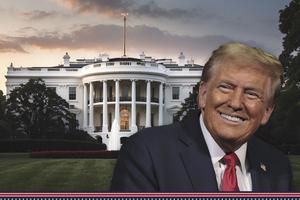Mainstream Media Blurs Focus on Assassination Attempt
COMMENTARY: The U.S. media appear distressingly uninterested in pursuing the details about why two would-be assassins have targeted Republican presidential candidate Donald Trump.

Our Lord instructed the Apostles to “be shrewd as serpents and simple as doves” before sending them out to retrieve the lost sheep of Israel in the Gospel of Matthew.
This directive could not be more apt for journalists and news consumers attempting to discern the truth through the smoke and mirrors of the present media landscape. Case in point: the dissembling coverage of the second assassination attempt of former President Donald Trump, which was cleverly conflated with the migrant controversy in Springfield, Ohio, to avoid casting Trump in a sympathetic light.
Last weekend, a would-be assassin hid for 12 hours in the shrubbery of a Florida golf course with a scoped rifle. A Secret Service member on Trump’s detail spotted the gun’s barrel poking through the leaves and opened fire, causing the alleged gunman, identified as a pro-Ukraine radical named Ryan Wesley Routh, to flee to his sports utility vehicle. Had it not been for a civilian snapping a photo of Routh’s license plate as he escaped, he might never have been apprehended.
This was the second attempt on Trump’s life in as many months. The assailant shared similar traits to Thomas Matthew Crooks, the shooter in Butler, Pennsylvania. Both were single, male loners who had donated to ActBlue, a fundraising platform for Democratic Party campaigns. Both had acquired high-tech weaponry and meticulously carried out their plots to kill the Republican nominee.
Most disturbingly, both had unusual overseas communications. For reasons still unclear, Crooks used encrypted messaging accounts on numerous online platforms located in Germany, New Zealand and Belgium.
For his part, Routh’s overseas activity was so extensive — beginning in April 2022, Routh worked to recruit Afghan soldiers who fled the Taliban to the Ukraine war effort — that he was featured in a 2023 article in the New York Times. And in a self-published 2023 book, Routh vented his anger at Trump for pulling out of the Iran Nuclear Deal in 2018. In one bizarre passage, Routh implores Iran to assassinate the former president.
The latter revelation is particularly noteworthy following reports that Iran had been plotting to kill Trump as retribution for the 2020 killing of Qasem Soleimani, commander of the Iranian military’s Islamic Revolutionary Guard Corps. Furthermore, the FBI revealed this week that Iranian hackers sent “stolen, non-public material from former President Trump's campaign as text in the emails” to the Biden campaign earlier this summer.
And yet, despite containing details fit for a Tom Clancy novel, the U.S. media appear distressingly uninterested in pursuing the story. Instead, prominent figures in the American press chose to conflate the second assassination attempt with the most recent Trump controversy involving the integration of 15,000 Haitian migrants in Springfield.
In the 72 hours following the attempt, media watchdog group Media Research Center found that 95% of the coverage of Trump by ABC, NBC and CBS was “negative.”
Speaking hours after the attack, for example, NBC News anchor Lester Holt framed the event in the following way:
Today's apparent assassination attempt comes amid increasingly fierce rhetoric on the campaign trail. Mr. Trump, his running mate JD Vance, continue to make baseless claims about Haitian immigrants in Springfield, Ohio. This weekend, there were new bomb threats in that town.
In the New York Times, chief White House correspondent Peter Baker pinned the blame for Trump’s assassination on — you guessed it — Trump himself, also citing the former president’s comments about Springfield as the key accelerant to political violence.
And in its initial report of the Florida assassination attempt, the publicly funded PBS spent only 30 seconds describing the incident before pivoting to Springfield.
By presenting these unrelated stories together, the public is left with the impression that Trump’s rhetoric on Haitian migrants caused the shooting. The problem, of course, is that the known facts of the assassination attempt contradict this framing.
While the first assassination attempt in Butler remains shrouded in mystery both in regard to the Secret Service’s many mistakes that day — this week, Sen. Richard Blumenthal (D-CT), who is leading the Senate investigation on the attempt, said he was “on the verge of outrage” over the Secret Service’s lack of cooperation — and the shooter’s motives, Routh’s motives are spelled out in his own self-published book. While not a fan of Trump — indeed, his truck has a Biden-Harris bumper sticker — there is no evidence he was “incited” to violence by the Springfield controversy. Instead, it appears he acted in response to foreign policy decisions made by the former president years ago.
The “incitement” framing of the Florida assassination attempt appears not only erroneous on the merits but lends to the narrative that Trump is receiving unfair treatment from the media. Following the first presidential debate on ABC during which he was repeatedly “fact-checked” while Harris’s many dubious claims went unchallenged, this perception is not without merit. It also obscures the controversy in Springfield, in which Catholics are called to reject the dehumanization of political refugees while discerning the best pathway forward for our immigration system.
Worst of all, this framing fails to address the most pertinent question following the incident: Why are men with sophisticated weaponry and meticulous plans targeting the former president for assassination?
May the Holy Spirit give the faithful the wisdom of serpents in these bewildering times.
- Keywords:
- donald trump
- mainstream media

















